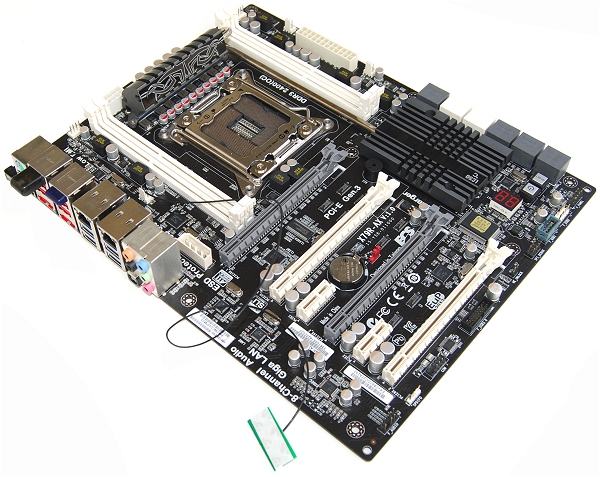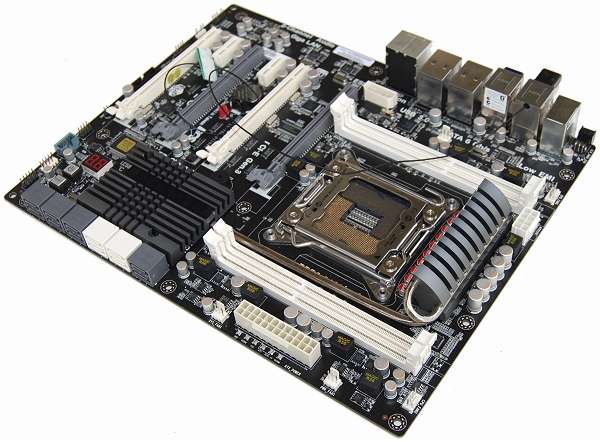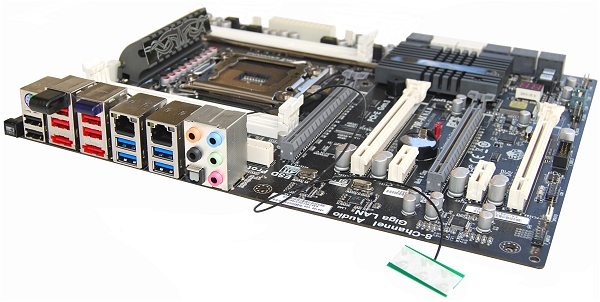ECS X79R-AX
ECS hastily embraced LGA2011, releasing two Black Series motherboards in time for launch day: the X79R-AX and X79R-AX Deluxe. Unfortunately, we found them confusing for several reasons, not least of which is their naming scheme. The "Deluxe" model is actually the cut down version with fewer SATA ports, no eSATA and a single network controller, while the plain "X79R-AX" is the flagship.
What's more confusing, ECS claims the X79R-AX 14 SATA ports with 10 connected to the X79 chipset, which is only supposed to support six. The board supposedly has six SATA 6Gb/s ports and four SATA 3Gb/s ports wired to the X79, but Intel's block diagrams clearly says the chipset supports two 6Gb/s ports and a total of six SATA ports – two 6Gb/s and four 3Gb/s ports, in other words.


Intel's tech manager assures me that the X79R-AX's extra SATA ports must be connected to a third party controller, while ECS promises 10 are powered by the X79. ECS went on to say that Intel has removed (or merely hidden, as it seems) the X79's four extra SATA/SAS ports, but the Taiwanese motherboard manufacturer has managed to enable them on the X79R-AX. Very interesting.

To our knowledge, ECS is the only manufacturer to enable these four hidden SATA/SAS ports. The company says that not all hard drives will work on the four SATA 6Gb/s (SAS) ports, but we couldn't obtain a list of compatible drives, nor did we receive a detailed explanation on why some drives won't work, how the "hidden" ports were enabled or why Intel disabled them in the first place.

To recap, the X79R-AX features 14 SATA ports. If you believe ECS, the X79 provides two SATA 3Gb/s ports, four SATA 6Gb/s ports and four SATA (SAS) 6Gb/s ports. Additionally, ECS added two ASmedia ASM1061 controllers for another four SATA 6Gb/s ports – one controller is used to boost the onboard SATA port count to 12, while the other provides a pair of eSATA ports on the board's I/O panel.

Networking is tackled by Realtek RTL8111E Gigabit LAN controllers, while audio is handled by a Realtek ALC892 8-Channel High Definition audio codec. The read I/O panel also houses an Atheros AR9271L controller providing wireless support using USB 2.0. Another Atheros controller, the AR3001, is also piggybacked on the USB 2.0 interface to supply the board with Bluetooth support.

ECS has employed two Texas Instruments USB 3.0 xHCI compliant host controllers. However, whereas Asrock used the TUSB7340 controllers to power its board's eight USB 3.0 ports, ECS has used one TUSB7340 along with a TUSB7320. In all, the X79R-AX carries six USB 3.0 ports, four of which are located on the rear I/O panel and the other two are available through an onboard header.


Folks hoping to install multiple graphics cards will find plenty to like on ECS' flagship board, as it truly supports quad-SLI and CrossfireX. Unlike the boards by Asus and Asrock, the X79R-AX offers enough elbow room for four dual-slot graphics cards. However, its RAM capabilities aren't quite as extensive with "only" four DIMM slots (64GB is supported, but 16GB modules aren't commonplace).


Overall, the ECS X79R-AX is a decent looking product that bears a modest price tag, though there are a few disappointing aspects. For example, the wireless antenna looks very cheesy in our opinion and we were bummed to discover it's not removable. Additionally, the UEFI BIOS doesn't feel nearly as polished as the Asus and Asrock versions, though it does work well enough for general users.
